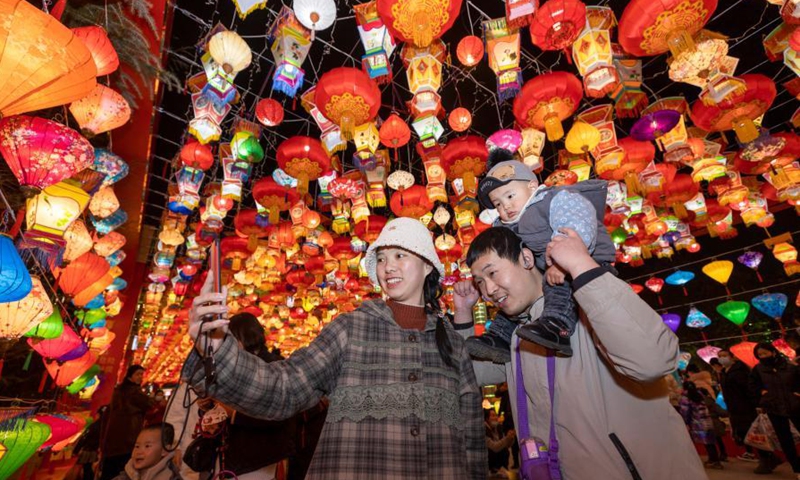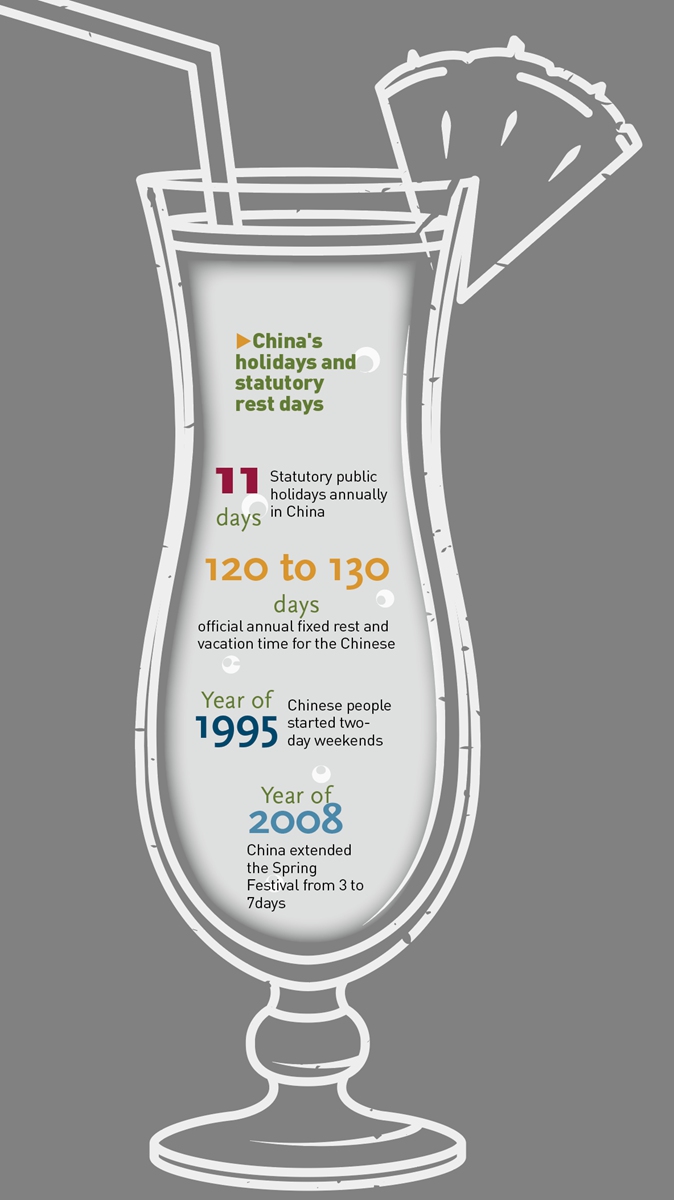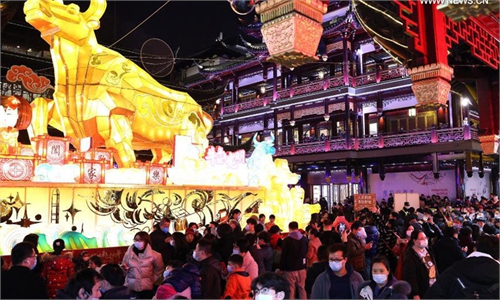Lawmakers debate giving employees more holiday time as economic boom improves livelihoods
Rest assured

Citizens view lanterns ahead of the Spring Festival at Nanfeng Square in Yuncheng city, North China's Shanxi Province, Feb. 7, 2021. Photo:Xinhua
Several recommendations on public holidays proposed during this year's two sessions have been trending across China's social media and sparked heated discussions over whether there should be more holidays for Chinese people.
Many people have expressed their eagerness for longer holidays which they believed could boost the productivity of weary workers and shore up the economy by stimulating consumption, while some others believe it to still be premature to extend holidays in China.
Currently, people can enjoy 11 statutory public holidays per year; the figure is four days shorter than Chile, Argentina and Japan which have the world's highest number of statutory public holidays for its people. But China's average paid leave days are far less than most developed countries.
Experts say the growing discussion over longer holidays reflects an increasing emphasis on the basic interests of workers' rights in Chinese society. Longer vacations are also a popular trend as China's labor force becomes more efficient and the economy becomes more reliant on domestic demand.
Meanwhile, there is a growing trend of an increasing number of people calling for extended holidays for family reunion as well as longer holidays for expectant women and their husband in order to encourage giving births.
China's labor efficiency has been greatly improved since the reform and opening-up of China in 1978, and now the country has moved toward an economic structure driven by domestic demand.
Considering that China's domestic consumption potential is huge, a revitalization of service industries like personal care, sports, and physical recreation, hospitality, and entertainment requires longer public holidays to achieve its goal, Cong Yi, a professor at the Tianjin University of Finance and Economics, told the Global Times.
Desiring for more leisure
"Extending public holidays like the Spring Festival to boost consumption and promote family reunions" was one of the most highly rated proposals during the two sessions. Many call it the right time for extending holidays to rejuvenate the economy and stimulate consumption as the Chinese society returns to normal with the COVID-19 epidemic being brought well under control.
The popular proposals also reflect a deep desire for leisure time among many Chinese workers who have long suffered from working overtime.
China has completed its industrialization and reached an upper-middle-income level. The public need has been significantly upgraded to emphasize a life-work balance, Cong noted.
Popular proposals at this year's two sessions, such as providing paid parental leave for both spouses, offering men no less than 20 days of paternity leave, and increasing paid leave for those who are the only child to care for elderly parents, have all emphasized the protection of family and childcare rights, observers say.
Family-oriented proposals are the most eye-catching ones among the proposals to the two sessions. Chinese netizens marked them the most socially compassionate ones that show the great importance the country attaches to childbirth and family welfare.
Some also propose special types of leave for women, such as menopausal paid care leave which was brought about for the first time. But some of the proposals have also caused controversy for allegedly casting women back in antiquated family roles, such as one advising to extend maternity leave to three or six years, which was criticized for causing discrimination against working women.
Analysts said that there being a general trend of increasing holidays would show personal care. However, the specific plan still needs more analysis and debate. A well-designed vacation plan can indirectly boost fertility and promote gender equality, Zhang Li'ning, a researcher from the Center for International Economic Research at Tsinghua University, said.

Photo: GT
Inevitable trend
There are a total of 11 statutory public holidays annually in China. The official annual fixed rest and vacation time for the Chinese is 120 to 130 days, accounting for about one-third of the whole year.
"Statistics showed that the number of statutory holidays in China is actually similar to that in many foreign countries," said Li Chang'an, a professor at the School of Public Administration at the University of International Business and Economics.
In 1995, Chinese people finally started to enjoy two days off during the weekends instead of having only one day a week to rest. Cong said China's reform and opening-up has boosted productivity and led to a big increase in the number of vacations.
"The increase of the holidays lies in the development of both the technology and labor productivity," said Wang Qiyan, director of the Leisure Economy Research Center at the Renmin University of China.
But it's worth noting that China's annual average paid leave of just five days [for people working less than 10 years] is far less than most other countries with over 20 days. By the total number of holidays, China ranks at the 39th place globally, according to data reported by media.
Therefore, a call for staggered holidays or long weekend breaks has become dominant presently.
In fact, various efforts for longer holidays or weekend breaks have never stopped over the years. In February, a deputy to the National People's Congress proposed a four-and-a-half-day workweek, after some places having already tried such a policy.
But the proposal was rejected by the Ministry of Human Resources and Social Security which countered that it was not realistic to further reduce the weekly work hour standard and that it should not be widely adopted in enterprises.
In the current economic situation, cutting working hours will increase pressure on businesses to produce and operate, bringing higher labor costs and overheads, and ultimately affect economic development, the Ministry of Human Resources and Social Security said in response.
Some scholars also believe it is not necessary to increase the number of statutory holidays.
Instead of increasing the number of holidays, authorities should emphasize more on changing the culture of working long hours among Chinese employees, especially unpaid overtime, Li noted.
The average work time for enterprise employees in China was close to 47 hours in November 2020, official data showed. That means that employees worked more than nine hours per day.
"The working hours of Chinese workers are among the longest in the world," Li told the Global Times.
The city of Shenzhen, in South China's Guangdong Province, approved in November 2020 a compulsory paid leave in a bid to ensure the wellbeing of the local labor force in the Chinese tech hub.
But its implementation might not be ideal. Experts have criticized the lack of clear standards for the enforcement of the provisions.
Most economists overall agreed the trend of China's holiday system is in line with China's long-term macroeconomic restructuring and the international trend.
Cong believes that the extension of holidays in China is an inevitable future trend, along with social and economic progress and optimized production patterns in near future.



